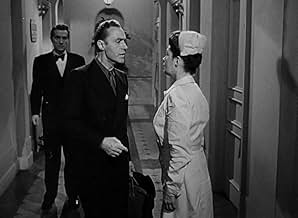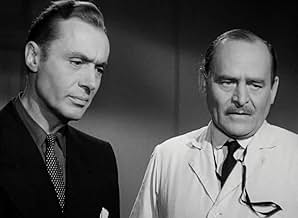NOTE IMDb
6,3/10
2,1 k
MA NOTE
Ajouter une intrigue dans votre langueIllegal refugees lead dark lives in pre-World War II Paris.Illegal refugees lead dark lives in pre-World War II Paris.Illegal refugees lead dark lives in pre-World War II Paris.
- Réalisation
- Scénario
- Casting principal
- Récompenses
- 3 victoires au total
Richard Alexander
- Gestapo Agent
- (non crédité)
Sylvia Andrew
- Milan Charwoman
- (non crédité)
Frank Arnold
- Newsboy
- (non crédité)
Jessie Arnold
- Cashier
- (non crédité)
George Balooi
- Scheherazade's Waiter
- (non crédité)
Avis à la une
Not sure about this one. There's much to like; the atmosphere, the camera work, the lighting and shadows, the closeups, the acting. But something's missing, perhaps continuity, or the impression that it all somehow fits together. Taken as a series of vignettes this film is very good. Combine the vignettes to tell a subset of the original story and it could be even better. But put it all together and it succumbs under the sheer weight of all the subplots.
And yet, despite my criticism, I am pleased to have seen it. As I said there's much to like, especially the acting. Louis Calhern is always a joy and here he lends a nuanced gravitas to his part. Charles Boyer is better than usual playing a tormented refugee torn between love and revenge. Charles Laughton is the pivot about which the story revolves and without him his one dimensional character would have been but a caricature. There's even a memorable cameo by an uncredited William Conrad. His scene is no more than a minute or so but it's not one you're likely to overlook or forget. But the best reason to watch it is of course Ingrid Bergman. Her effortless ability to switch personalities simply draws you in to her performance. Here she plays an insecure wreck, an incredibly seductive, infuriatingly deceitful and mostly terrified woman. Her character's choices are not perhaps entirely honorable but with Bergman who cares...
And yet, despite my criticism, I am pleased to have seen it. As I said there's much to like, especially the acting. Louis Calhern is always a joy and here he lends a nuanced gravitas to his part. Charles Boyer is better than usual playing a tormented refugee torn between love and revenge. Charles Laughton is the pivot about which the story revolves and without him his one dimensional character would have been but a caricature. There's even a memorable cameo by an uncredited William Conrad. His scene is no more than a minute or so but it's not one you're likely to overlook or forget. But the best reason to watch it is of course Ingrid Bergman. Her effortless ability to switch personalities simply draws you in to her performance. Here she plays an insecure wreck, an incredibly seductive, infuriatingly deceitful and mostly terrified woman. Her character's choices are not perhaps entirely honorable but with Bergman who cares...
This is certainly not Ingrid Bergman's best movie, though her performance as Joan, and Boyer's as Ravic, are terrific. But you will never see a more beautiful Ingrid than in the magnificent black and white =chiaroscuro= of Russell Metty's photography, and Ingrid is very touching as the "lost woman" hinted at but never fully realized in "Casablanca" and "Notorious." Even considering that Bergman was gorgeous on screen for almost forty years, her stunning image in this somewhat confused thriller-soap opera, is worth the price of admission; plus the dialogue is pretty good, and you get to see Charles Laughton as an evil Nazi colonel!
More people should know about this wonderful film--reading the book in advance really enhances the experience of it, but one can just enjoy the incredible performances of Bergman and Boyer (not to mention the excellent character roles, particularly Charles Laughton). The use of light/shadow is also extremely well done and atmospheric. It's high time someone re-releases this movie on DVD (Criterion, perhaps), because it's another wonderful example of classic film noir, very well executed.
For those not familiar with Remarque's novel, it's a must-read--although I warn you, after you're done you will have an insane urge to try Calvados.
For those not familiar with Remarque's novel, it's a must-read--although I warn you, after you're done you will have an insane urge to try Calvados.
Lewis Milestone scored his greatest film success when he did the classic adaption of Erich Maria Remarque's novel All Quiet on the Western Front in 1931. It seemed a natural for him to do an adaption of another Remarque book, Flotsam, retitled here as Arch of Triumph. I guess that United Artists didn't want the audience to think the film was about sea refuse.
Unfortunately while All Quiet on the Western Front stayed very much on its anti-war message, Milestone opted to make one of those tragic romances that Frank Borzage was more noted for. The problem of all the refugees from all the political turmoil up to THAT time collecting in places like Paris was left very much in the background.
Charles Boyer is one of those refugees, a Czech who can't go back to his own country because of Hitler's bloodless takeover. He's a doctor who's been serving in Loyalist Spain and got run out of there. With no passport, he's an illegal alien in France in 1939 and subject to deportation which he is by the way at one point in the film.
He meets Ingrid Bergman who's also a refugee of sorts from a series of bad relationships. He saves her from suicide and a relationship develops. In fact when Boyer is deported, she does what she has to do to survive.
Louis Calhern may have the best role in the film as Boyer's friend and counselor, an exiled Russian Lieutenant Colonel of the Czar's guard who is a doorman at a swank Russian café. Charles Laughton is in here to as an S.S. officer who Boyer remembers killing his old girl friend back in Spain and who he hunts without mercy. Laughton has one of the smallest roles he ever did in a film and I wish there were more of him here.
Laughton is seen briefly at the beginning doing the torture in his best Inspector Javert manner. Later on when Boyer spots him and makes his acquaintance to lure him for the kill, he's an avuncular tourist, but clearly on some kind of mission. He's good in both sides of the same character.
It's a real downer of a film, Arch of Triumph. Good thing we know how history turned out because it sure doesn't look good for the good guys when this film ends.
Unfortunately while All Quiet on the Western Front stayed very much on its anti-war message, Milestone opted to make one of those tragic romances that Frank Borzage was more noted for. The problem of all the refugees from all the political turmoil up to THAT time collecting in places like Paris was left very much in the background.
Charles Boyer is one of those refugees, a Czech who can't go back to his own country because of Hitler's bloodless takeover. He's a doctor who's been serving in Loyalist Spain and got run out of there. With no passport, he's an illegal alien in France in 1939 and subject to deportation which he is by the way at one point in the film.
He meets Ingrid Bergman who's also a refugee of sorts from a series of bad relationships. He saves her from suicide and a relationship develops. In fact when Boyer is deported, she does what she has to do to survive.
Louis Calhern may have the best role in the film as Boyer's friend and counselor, an exiled Russian Lieutenant Colonel of the Czar's guard who is a doorman at a swank Russian café. Charles Laughton is in here to as an S.S. officer who Boyer remembers killing his old girl friend back in Spain and who he hunts without mercy. Laughton has one of the smallest roles he ever did in a film and I wish there were more of him here.
Laughton is seen briefly at the beginning doing the torture in his best Inspector Javert manner. Later on when Boyer spots him and makes his acquaintance to lure him for the kill, he's an avuncular tourist, but clearly on some kind of mission. He's good in both sides of the same character.
It's a real downer of a film, Arch of Triumph. Good thing we know how history turned out because it sure doesn't look good for the good guys when this film ends.
This could have been a much better movie. Boyer's disenchanted, vengeful refugee doctor is excellent and Bergman's Joan, unable to commit or disengage, could have been a fascinating characterisation. But while individual scenes are very fine, the film, as a whole, is oddly disconnected, suggesting ruthless cutting. The sub-plot involving Laughton's porcine Gestapo bully is perfunctory and we get far too much of Calhern's emigre. Still, the black and white photography is impressive, and I rather went for the doom and gloom!
Le saviez-vous
- AnecdotesThe rough cut of the film ran four hours. In reducing it to two hours, several actors were cut, including Ruth Warrick. She does appear briefly in the restored 133-minute version.
- GaffesWhen Ravic takes his gun and goes to look for Haake in the streets, the first shot of him has been reversed for some reason as evidenced by the signs he passes, which are backwards.
- Citations
Joan Madou: He wanted to kill me. They always talk about it but they never do.
[laughs]
Joan Madou: You wouldn't want to kill me.
- ConnexionsFeatured in Legendy mirovogo kino: Charles Boyer
- Bandes originalesLong After Tonight
(1948) (uncredited)
Music by Rudolph Polk
Music by adapted from the Russian folk song "Prochlada"
Lyrics by Ervin Drake and Jimmy Shirl
Sung by an uncredited singer dubbing Ingrid Bergman at the Scheherazade casino
Meilleurs choix
Connectez-vous pour évaluer et suivre la liste de favoris afin de recevoir des recommandations personnalisées
- How long is Arch of Triumph?Alimenté par Alexa
Détails
- Date de sortie
- Pays d’origine
- Langues
- Aussi connu sous le nom de
- Arch of Triumph
- Lieux de tournage
- Sociétés de production
- Voir plus de crédits d'entreprise sur IMDbPro
Box-office
- Budget
- 5 000 000 $US (estimé)
- Durée
- 2h(120 min)
- Couleur
- Rapport de forme
- 1.37 : 1
Contribuer à cette page
Suggérer une modification ou ajouter du contenu manquant


































